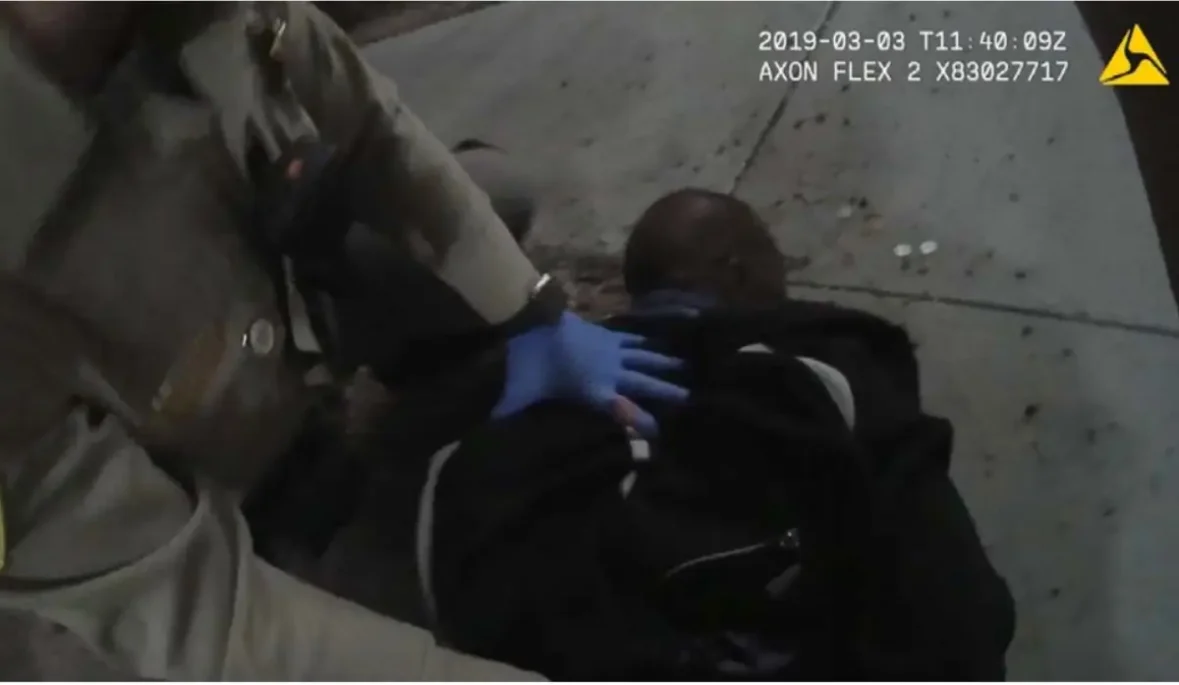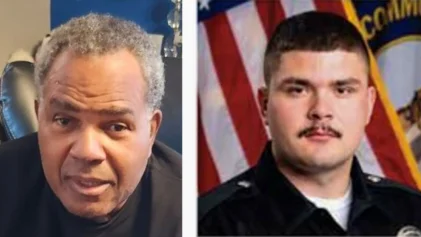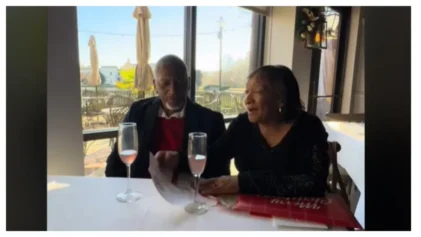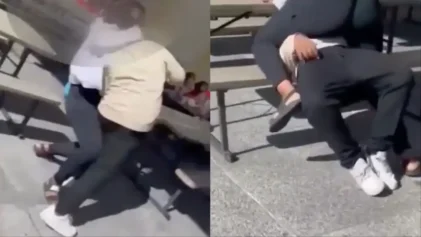Two Las Vegas police officers who kneeled and sat on a mentally ill man who had called 911 for help will have to face excessive force claims for killing him, a federal appeals panel ruled last week.
Las Vegas Metropolitan Police Department had contended that qualified immunity should shield the officers and the department from a wrongful death lawsuit filed in 2020 on behalf of Roy Anthony Scott. But a three-judge panel of the 9th Circuit Court of Appeals affirmed a district court’s ruling in 2023 that found that qualified immunity doesn’t apply in this case.
Officers Kyle Smith and Theodore Huntsman “violated Scott’s Fourth Amendment right to be free from excessive force,” wrote U.S. Circuit Judge Roopali Desai on behalf of the panel in a 24-page opinion. “Because Scott was mentally ill, was not suspected of a crime, and did not present a risk to officers or others, the government’s interest in applying force was limited.”

“Our caselaw makes clear that any reasonable officer should have known that bodyweight force on the back of a prone, unarmed person who is not suspected of a crime is constitutionally excessive,” she added.
The encounter between Scott, 65, and the police officers began at 3 a.m. on March 3, 2019, when Scott called 911 and reported multiple assailants his apartment, one with a saw. Dispatch notified the officers that Scott was mentally ill. Las Vegas police had had multiple interactions with Scott in the past, some involving medical holds for mental health concerns and trips to the hospital.
Scott was “distressed and hallucinating when Smith and Huntsman arrived at his apartment,” according to the opinion’s summary of the facts. He refused the officers entry and yelled at them to break down the door because there were people inside his house. The officers, looking through a window, determined no one was actually inside, and Huntsman noted that Scott had a “crazed look” in his eye and a “thousand mile stare.”
Scott eventually emerged from his apartment holding a metal pipe at his side, and Smith, standing at the bottom of his entryway stairs, pulled his gun and told Scott to drop it, which he did.
The judge’s summary of the event continues:
“Disoriented, Scott asked the officers twice: “What am I supposed to do?” Smith and Huntsman directed him to stand near a wall at the base of the stairs, and Scott immediately complied. When Huntsman asked Scott if he had any other weapons, Scott produced a knife from his front pocket and said, “I am sorry.” He handed the knife to Huntsman handle-side out and did not make any threatening gestures.
Smith and Huntsman ordered Scott to face the wall, shining a flashlight at him. Scott told them that the light bothered him and that he had paranoid schizophrenia. He asked twice: “Can you just put me in the car please?” When asked about the weapons he had relinquished, Scott explained, “I think people are after me.” Smith again directed Scott to face the wall, and Scott replied, “I’m paranoid, I can’t turn around.” Smith told Scott, “You’re fine. We are out here to help you.” Scott repeatedly responded, “I’m not fine.” Although they did not discuss it, officers allege they recognized Scott was in “some sort of distress” and concluded he met the qualifications for a medical hold for his mental health and safety.
Smith and Huntsman approached Scott and grabbed his arms. Scott repeatedly pleaded “please” and “what are you doing” in a distressed voice, while Smith and Huntsman pulled him to the ground. At first, the officers held Scott’s arms at his sides while he was lying on his back. In this position, Scott screamed, struggled, and pled with the officers to leave him alone for over two minutes. The officers then eventually rolled Scott onto his stomach, repeatedly ordering Scott to “stop.” With Scott on his stomach and with his hands restrained behind his back, Huntsman put his bodyweight on Scott’s back and neck for about one to two minutes. At the same time Smith put his weight on Scott’s legs, restraining his lower body. Scott’s pleas turned increasingly incoherent and breathless as Huntsman applied his bodyweight.
After handcuffing him, the officers attempted to roll Scott on his side, as he continued to incoherently cry out that he wanted to be left alone. When they rolled Scott over, his face was bloody from contact with the ground. Scott stopped yelling and thrashing around after a few minutes. Scott did not respond when Smith and Huntsman tried to wake or revive him. Shortly after, when the paramedics arrived, Scott was still unresponsive. Scott was pronounced dead after paramedics removed him from the scene. Plaintiffs’ expert found that Scott had died from restraint asphyxia.”
In the immediate aftermath of the incident, Las Vegas police insisted that Scott died from medical complications related to an apparent drug overdose. Deputy Chief Chris Jones conducted a news conference to review the event and said there was “no reportable use of force.”
He said the two officers believed that Scott was “exhibiting signs of illicit narcotics usage” and experiencing “excited delirium,” a diagnostic theory commonly used by police to explain how a person experiencing severe agitation can suddenly die while being restrained. It was one defense used by police in the restraint asphyxiation case of George Floyd in Minnesota. Many states have since deemed it a discredited diagnosis and abandoned its use.
During a post-incident interview, Huntsman, noting that Scott was short of breath, said, “It was really weird how he went from, you know, fighting to – to being still.”
Officer Smith, in his interview, said Scott was “strong for being a 60-something year-old male he was putting up a fight of like a 20-year-old.”
Smith further described their effort to subdue and handcuff Scott:
“My partner put his, uh, put his left leg across his upper torso and I had mine across his butt. When he started struggling I kinda slipped to a position where I was practically sitting on top of him instead of my knee going across him the way that we’re trained. Um, we were still able to get him handcuffed. It took a few extra minutes to get him cuffed but we got both hands secured and cuffed. The whole time he was, uh, he was grabbing at us, kicking and struggling and stuff like that. Um, once he was handcuffed he was still kinda in the panic mode. He was rolling around all over the ground. Um, we tried to lay him on his side in the recovery position initially and, uh, he was laying in the recovery position. He was still struggling just kinda rolling around. He ends up laying on his back again on top of his handcuffed hands. … He’s screaming and yelling the entire time, uh, “Don’t touch me. Don’t hurt me.” … At that point he was laying facing straight up and … it was like a very quick overwhelmingly calm that kinda came over him where it was just one minute panic mode and the next minute it was calm. And I kinda recognized that was him coming down off of … the excited delirium.”
Two weeks after the incident, the Clark County coroner ruled the death of Scott an accident, saying his cause of death was methamphetamine intoxication.
In the wrongful death complaint filed against the officers and Las Vegas police in October 2020 by Rochelle Scott, Roy Scott’s daughter, attorney Peter Goldstein argued that Scott died “shortly after being subjected to a pressure restraint” while prone on the sidewalk in the custody of Smith and Huntsman, “one of whom kneeled on Scott’s neck and back for over 90 seconds as Scott cried and pleaded to be placed in the patrol car.”
The complaint noted that Scott “said ‘please’ 63 times over eight minutes before becoming motionless,” after which “Scott never received chest compressions or CPR of any kind until Medic-West Ambulance arrived approximately nine minutes later.”
The officers used “unreasonable and/or deadly force against Scott by physically struggling with him in order to restrain him, failing to accommodate his disability, taking actions which aggravated his paranoia, failing to deescalate the situation, physically wrestling with him on the ground and … kneeling with his weight on his neck and back, and failed to provide any assistance for nine minutes between the time stopped moving until the time paramedics arrived at the scene.”
The lawsuit says the officers “knew or should have known” that because of his impairment, they were required to “exert greater effort and caution to take control of the situation through less intrusive means.“ It alleges their crisis intervention training was inadequate and that the Las Vegas police department also failed to adequately train them on how to handle individuals with mental or emotional disabilities and the use of deadly force.
“You just don’t treat people like that, especially with a mental illness,” Rochelle Scott told the Las Vegas Review-Journal. “They knew who he was.”
“My dad, he needed help. He didn’t need to be apprehended, handcuffed,” she said, The Associated Press reported. “He didn’t deserve to go out like that — like a dog in the street. They made him look like a monster, like he was just this dopehead and nobody cared and loved him. That was not the case.”
She said she hoped the lawsuit would spur progress in the police reform movement and encourage more use of social workers and crisis teams to respond to people with mental illnesses who call 911.
The lawsuit seeks compensatory and punitive damages on behalf of Rochelle Scott and the estate of Roy Scott, as well as funeral and burial expenses and attorney’s fees.
During the oral arguments before the Ninth Circuit Court of Appeals last May, Craig Anderson, the attorney for the police officers, noted that the federal district court had found no probable cause for the officers to do a mental health hold and to detain Scott.
“Here the facts justify it,” said Anderson, noting that Scott said he was suffering from paranoid schizophrenia and had had prior mental health holds. Because Scott had already presented two weapons to the officers, they had “a justifiable concern to pat him down and make sure he had no more weapons and investigate the severity of his mental health crisis,” he said.
Anderson also argued that legal precedent established that the use of bodyweight on a prone individual is only excessive if the person is handcuffed, noting that officers were only pressing on him for 8 seconds while he was handcuffed.
“Weren’t his hands restrained behind his back?” while the officers kneeled and sat on him prior to that, Desai asked. “What’s the meaningful difference?”
In her opinion, Desai said the restraint used by the officers “was the functional equivalent of being handcuffed,” and “more critically, the officers received fair notice that their force was constitutionally excessive.”
Plaintiff’s attorney Goldstein told the panel, “There was no basis to take him in,” noting that Scott “was not a danger to himself or others,” he said. “He was begging for his life.”
Goldstein asserted that the differing expert opinions over Scott’s cause of death and whether excessive force was used “should be determined by a jury.”
The appeals court agreed with him in sending the case back to the U.S. District Court for Nevada in Las Vegas.


